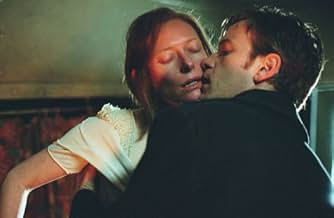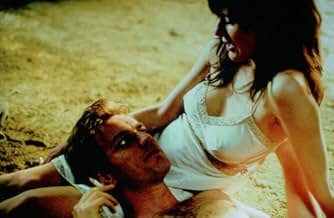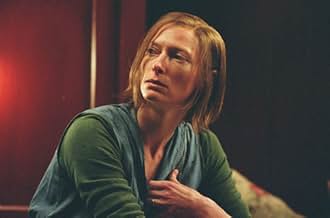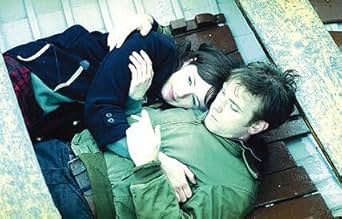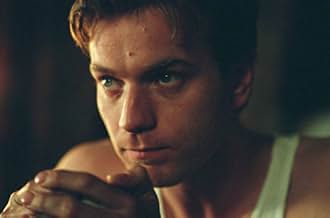AVALIAÇÃO DA IMDb
6,3/10
15 mil
SUA AVALIAÇÃO
Um jovem desabrigado que trabalha em uma barcaça do rio perturba a vida de seus empregadores enquanto esconde o fato de saber mais sobre uma mulher morta encontrada no rio do que ele admite.Um jovem desabrigado que trabalha em uma barcaça do rio perturba a vida de seus empregadores enquanto esconde o fato de saber mais sobre uma mulher morta encontrada no rio do que ele admite.Um jovem desabrigado que trabalha em uma barcaça do rio perturba a vida de seus empregadores enquanto esconde o fato de saber mais sobre uma mulher morta encontrada no rio do que ele admite.
- Direção
- Roteiristas
- Artistas
- Prêmios
- 7 vitórias e 17 indicações no total
- Direção
- Roteiristas
- Elenco e equipe completos
- Produção, bilheteria e muito mais no IMDbPro
Avaliações em destaque
Young Adam is a powerful and atmospheric drama set on the canals between Glasgow and Edinburgh during the 1950s.
Ewan McGregor is Joe, a drifter working on a barge, when he and his boss find a body in the canal. As he begins an affair with the bargeman's wife (Tilda Swinton), we find out more about his previous relationship with the drowned woman (Emily Mortimer).
Adapted from the novel by Scottish Beat writer Alexander Trocchi, Young Adam is, in some ways, a kitchen sink drama a vivid picture of working class life in its unpleasant reality. One of the best examples of this type of film is Room at the Top (1959). But Young Adam has existentialist overtones: Joe is alienated and passive, and not only do his numerous sexual couplings offer him little pleasure, but in rejecting the only thing that could redeem him, he condemns himself to a meaningless life. This might sound too depressing, but screenwriter and director David Mackenzie gives the film great depth and sensuality. Very interesting. ****/***** stars.
Ewan McGregor is Joe, a drifter working on a barge, when he and his boss find a body in the canal. As he begins an affair with the bargeman's wife (Tilda Swinton), we find out more about his previous relationship with the drowned woman (Emily Mortimer).
Adapted from the novel by Scottish Beat writer Alexander Trocchi, Young Adam is, in some ways, a kitchen sink drama a vivid picture of working class life in its unpleasant reality. One of the best examples of this type of film is Room at the Top (1959). But Young Adam has existentialist overtones: Joe is alienated and passive, and not only do his numerous sexual couplings offer him little pleasure, but in rejecting the only thing that could redeem him, he condemns himself to a meaningless life. This might sound too depressing, but screenwriter and director David Mackenzie gives the film great depth and sensuality. Very interesting. ****/***** stars.
One of the more quietly desperate films of recent past, Young Adam is an interesting study of lower working class characters - working poor, perhaps set against an idyllic Scotland river life we have probably never seen. That working barges ply streams with bridges so narrow that crew must guide the craft along by kicking the tunnel-like sides of passage and canals and rivers are so pastorally picturesque is an awfully artful examination of a simpler time.
Joe (Ewan McGregor), a hired hand laboring on a barge-of-all-trades is the bad-boy promiscuous lover of any and all girls within contact. Torrid sex with any and all of them is his single-minded purpose, we gather at first. But we quickly find he 1.) is or was a writer (failed or perhaps more correctly never-started) 2) is linked to a body found in a river and 3) is seemingly incapable of or devoid of emotion. But we are going to alter some our judgments of Joe as more is revealed.
Sexual promiscuity confined to abrupt, even relentless encounters is the main character's focus even though we know it is as unfeelingly given as it seems to be received. In one encounter, nearly violent in its depiction, we cannot see the face of his partner as she cries (or is she laughing?). Interestingly lit, we marvel at this singularly stark depiction of lust. Ella (Tilda Swinton) and her husband Les (Peter Mullan) have employed Joe on their barge and it is not long before we see how Joe has changed the dynamic in the marriage. It is with Les that Joe recovers the body of a woman floating in the river. Curiously Joe cannot manage the use of a boat hook to snare the woman's body; Les has to take over.
The story becomes one of determining who the woman is and how she fits into the story. Through flashbacks we see a disturbing development as as the police investigation of the dead woman ensues; we continue to follow this thread through the course of the film.
The music chosen for the film is unmemorable, but that may serve us well in that it is never a distraction. Time passes during the course of the story, but it could be a week, perhaps six months.
An interesting film, the title has been bandied about for its Biblical reference but reveals little about the matters at hand. In the final analysis the only surprise found in the movie is when a prominent figure merely disappears; consistent with the tempo, it is a profoundly quiet moment. Disturbing at every turn, this is a film charged with raw sexuality and should be seen to appreciate naturalistic film.
Joe (Ewan McGregor), a hired hand laboring on a barge-of-all-trades is the bad-boy promiscuous lover of any and all girls within contact. Torrid sex with any and all of them is his single-minded purpose, we gather at first. But we quickly find he 1.) is or was a writer (failed or perhaps more correctly never-started) 2) is linked to a body found in a river and 3) is seemingly incapable of or devoid of emotion. But we are going to alter some our judgments of Joe as more is revealed.
Sexual promiscuity confined to abrupt, even relentless encounters is the main character's focus even though we know it is as unfeelingly given as it seems to be received. In one encounter, nearly violent in its depiction, we cannot see the face of his partner as she cries (or is she laughing?). Interestingly lit, we marvel at this singularly stark depiction of lust. Ella (Tilda Swinton) and her husband Les (Peter Mullan) have employed Joe on their barge and it is not long before we see how Joe has changed the dynamic in the marriage. It is with Les that Joe recovers the body of a woman floating in the river. Curiously Joe cannot manage the use of a boat hook to snare the woman's body; Les has to take over.
The story becomes one of determining who the woman is and how she fits into the story. Through flashbacks we see a disturbing development as as the police investigation of the dead woman ensues; we continue to follow this thread through the course of the film.
The music chosen for the film is unmemorable, but that may serve us well in that it is never a distraction. Time passes during the course of the story, but it could be a week, perhaps six months.
An interesting film, the title has been bandied about for its Biblical reference but reveals little about the matters at hand. In the final analysis the only surprise found in the movie is when a prominent figure merely disappears; consistent with the tempo, it is a profoundly quiet moment. Disturbing at every turn, this is a film charged with raw sexuality and should be seen to appreciate naturalistic film.
Spoiler warning !!
Although the audience may not realise it initially, this film is carefully constructed with two story lines, one of which is through flashbacks that blend so seamlessly with the 'present' that it feels like it's running in parallel. As well, the director is in no hurry to give the audience everything all at once. He lets the flashback story seep through the screen in its good time. However, he does plant along the way plenty of details that may seem a little strange but make perfect sense as the story unfolds. The best example is at the very beginning. Joe (Ewan McGregor) and his employer Les (Peter Mullan) fish a woman's dead body form the Glasgow-Edinburgh canal which their barge is working. In the same evening, when they are having supper in the cabin with Les' wife Ella (Tilda Swinton) and little boy, Les asks Joe if he thinks that it's murder. Joe breaks out into an almost poetic description of what he thinks has happened, that the woman committed suicide. This near-monologue is totally out of character with lowly barge hand Joe, until two things are revealed later: Joe the writer (or his aspiration to be one), and his relationship with the dead woman.
Not only the past, but even the present, is revealed ever so gradually. As the sexual liaison between Joe and Ella develops, we are under the impression that Ella is very much of an abused (though not physically or violently) wife totally under the control of her husband. It isn't until Les confronting Joe on the deck that we see an unexpected turn of events, with Les' short, crisp announcement of 'It's her barge'. Although Les has never been exactly a model husband, it turns out that Ella is the real boss, in a very literal sense. We now see the tough side of Ella. When Les packs his things and leaves, wondering when he can see his son who is now at boarding school, we can't help but feel a little sympathy for him.
The film is certainly not made to please the mainstream audience. First, on the practical side, it does not care about political correctness, and shows cigarette smoking scenes in abundance. The film is shot with a general tone of depressing gloominess, with a few well placed out-focused scenes, the most noticeable being the ending scene with Joe walking away from the river. Yet, there is a melancholic beauty in the sometimes grainy photography. At the very beginning, the long-range shot of the dock and background scenery is so beautifully framed that it can easily win a price at a photography contest. Equally melancholic is the general use of the cello in background music. Sound off is not used that much. In fact I only recall one, the sound of buses and other street vehicles, cutting from Joe with Ella in bed at the cabin of the barge to a flashback of a busy street scene of his re-encounter with his ex-girlfriend Cathie (Emily Mortimer). The motif of the hand mirror inscribed with loving words from Cathie to Joe is, however, slightly over-used.
As to my summary line, all of the more subtle exchanges in the film are made in silence, rather than with dialogue. The two best examples are of course Joe's seduction of Ella and his first encounter with Cathy (in that order in the film, but in reverse order chronologically). There is of course dialogue but by the time it gets to the dialogue, the parties have already established an understanding beyond words.
One reviewer makes an insightful comparison of Joe to Camus' Outsider. Indeed, rather than being portrayed as an irresponsible libertine, Joe is shown as a confused outsider, often driven by his own physical desire, but not entirely without sensibility. This persona is echoed by the title Young Adam, still young but post-Garden of Eden, tossed into a cheerless world and doomed to an endless exile.
The acting is first class all around. McGreagor shows that he is made of sterner stuff than needed for a light-sabre-happy Obi-wan Kenobi or a love-sick Christian. Swinton works the layers of Ella amazingly well, first the passive, guilt-troubled wife (particularly at the second liaison when Joe breaks the lamp) then the liberated woman temporarily carried away with ideas of divorce and remarriage, and finally very quickly coming down to earth again. More easily overlooked is Mullan playing the cockolded husband, maybe not to the stupendous height of the gentleman at Camelot, but with his own grass-root poignancy. Mortimer's role may not be as demanding as the other three's, but her competent portrayal of Cathie's endearing young charm is quite necessary to make Joe's subsequent remorse convincing.
Young Adam is not for everybody, but definitely a marvellous cinematic experience to those with the capacity to appreciate.
Although the audience may not realise it initially, this film is carefully constructed with two story lines, one of which is through flashbacks that blend so seamlessly with the 'present' that it feels like it's running in parallel. As well, the director is in no hurry to give the audience everything all at once. He lets the flashback story seep through the screen in its good time. However, he does plant along the way plenty of details that may seem a little strange but make perfect sense as the story unfolds. The best example is at the very beginning. Joe (Ewan McGregor) and his employer Les (Peter Mullan) fish a woman's dead body form the Glasgow-Edinburgh canal which their barge is working. In the same evening, when they are having supper in the cabin with Les' wife Ella (Tilda Swinton) and little boy, Les asks Joe if he thinks that it's murder. Joe breaks out into an almost poetic description of what he thinks has happened, that the woman committed suicide. This near-monologue is totally out of character with lowly barge hand Joe, until two things are revealed later: Joe the writer (or his aspiration to be one), and his relationship with the dead woman.
Not only the past, but even the present, is revealed ever so gradually. As the sexual liaison between Joe and Ella develops, we are under the impression that Ella is very much of an abused (though not physically or violently) wife totally under the control of her husband. It isn't until Les confronting Joe on the deck that we see an unexpected turn of events, with Les' short, crisp announcement of 'It's her barge'. Although Les has never been exactly a model husband, it turns out that Ella is the real boss, in a very literal sense. We now see the tough side of Ella. When Les packs his things and leaves, wondering when he can see his son who is now at boarding school, we can't help but feel a little sympathy for him.
The film is certainly not made to please the mainstream audience. First, on the practical side, it does not care about political correctness, and shows cigarette smoking scenes in abundance. The film is shot with a general tone of depressing gloominess, with a few well placed out-focused scenes, the most noticeable being the ending scene with Joe walking away from the river. Yet, there is a melancholic beauty in the sometimes grainy photography. At the very beginning, the long-range shot of the dock and background scenery is so beautifully framed that it can easily win a price at a photography contest. Equally melancholic is the general use of the cello in background music. Sound off is not used that much. In fact I only recall one, the sound of buses and other street vehicles, cutting from Joe with Ella in bed at the cabin of the barge to a flashback of a busy street scene of his re-encounter with his ex-girlfriend Cathie (Emily Mortimer). The motif of the hand mirror inscribed with loving words from Cathie to Joe is, however, slightly over-used.
As to my summary line, all of the more subtle exchanges in the film are made in silence, rather than with dialogue. The two best examples are of course Joe's seduction of Ella and his first encounter with Cathy (in that order in the film, but in reverse order chronologically). There is of course dialogue but by the time it gets to the dialogue, the parties have already established an understanding beyond words.
One reviewer makes an insightful comparison of Joe to Camus' Outsider. Indeed, rather than being portrayed as an irresponsible libertine, Joe is shown as a confused outsider, often driven by his own physical desire, but not entirely without sensibility. This persona is echoed by the title Young Adam, still young but post-Garden of Eden, tossed into a cheerless world and doomed to an endless exile.
The acting is first class all around. McGreagor shows that he is made of sterner stuff than needed for a light-sabre-happy Obi-wan Kenobi or a love-sick Christian. Swinton works the layers of Ella amazingly well, first the passive, guilt-troubled wife (particularly at the second liaison when Joe breaks the lamp) then the liberated woman temporarily carried away with ideas of divorce and remarriage, and finally very quickly coming down to earth again. More easily overlooked is Mullan playing the cockolded husband, maybe not to the stupendous height of the gentleman at Camelot, but with his own grass-root poignancy. Mortimer's role may not be as demanding as the other three's, but her competent portrayal of Cathie's endearing young charm is quite necessary to make Joe's subsequent remorse convincing.
Young Adam is not for everybody, but definitely a marvellous cinematic experience to those with the capacity to appreciate.
The films focus on translating the novels first person perspective is clearly an obsession for this director. Never is the audiences attention allowed outside of Joe's point of view. We see only what he sees, we hear nothing more and we remember his life in little snatches, moments of dark disgusting and secret clarity he keeps from the world.
The film starts with a corpse, a barely dressed woman floating in the Clyde that is fished out by Joe; a young man working the barges for reasons that are not immediately clear. This brutal beginning in which we see Joe lay a tender hand on the cold dead flesh of the girl begins the film with a level of tension that rarely leaves the screen. Through his actions and - more importantly - his inactions we peel away the outer layers of a man on the run from himself, from responsibility and from guilt. We see him commit two murders by mission of inaction and we see him quietly dealing with that in one last lingering shot that tells us he will never change.
Joe is sexually driven to destroy life around him and he uses sex as a weapon against himself and against the possibility of settling or creating a future. He could be a writer, but he lacks the courage to read his own work. He could be a father, but he cannot face the thought of commitment. He could be a lover, but he makes love to women only as a means to an end, rejecting and pushing them away once the act is completed.
And this is the film in a nutshell. A relentless character study of an unpleasant man who punishes those around him for his own failings. Yes there is gratuitous sex in this film, but it has its place, it defines the moments of change in everyone else's lives while underlining the static character of Joe, played with utter brilliance by Ewen McGregor. The sex is cold, rather than erotic, reflecting the characters contempt for those he uses. Without the detailed sex scenes the film would be less than it is, but audiences expected to be titillated will come away disappointed.
Not without flaws this film has that perplexing title and a scene in which Joe beats his girlfriend after covering her with custard. The scene is alien to both the film and the character of Joe who gives no indication of being violent, rather a man that will walk out on a problem rather than face the awful possibility of confrontation. In fact Ewen McGregor seems embarrassed to play this scene, as though he too cannot link this outburst to the character he is playing.
But this minor quibble apart the film remains an artistically shot work, played with brilliance by everyone. Its rare to see a film where the whole cast are brilliant, where the script is clearly cut and the direction thought through. The visual aspect of the film is also tremendous with each shot being laid out in front of us like a painting, a wondrous work of art that moves and flows to show us the 60's post war Brittan with utter clarity.
Hollywood please take note.
The film starts with a corpse, a barely dressed woman floating in the Clyde that is fished out by Joe; a young man working the barges for reasons that are not immediately clear. This brutal beginning in which we see Joe lay a tender hand on the cold dead flesh of the girl begins the film with a level of tension that rarely leaves the screen. Through his actions and - more importantly - his inactions we peel away the outer layers of a man on the run from himself, from responsibility and from guilt. We see him commit two murders by mission of inaction and we see him quietly dealing with that in one last lingering shot that tells us he will never change.
Joe is sexually driven to destroy life around him and he uses sex as a weapon against himself and against the possibility of settling or creating a future. He could be a writer, but he lacks the courage to read his own work. He could be a father, but he cannot face the thought of commitment. He could be a lover, but he makes love to women only as a means to an end, rejecting and pushing them away once the act is completed.
And this is the film in a nutshell. A relentless character study of an unpleasant man who punishes those around him for his own failings. Yes there is gratuitous sex in this film, but it has its place, it defines the moments of change in everyone else's lives while underlining the static character of Joe, played with utter brilliance by Ewen McGregor. The sex is cold, rather than erotic, reflecting the characters contempt for those he uses. Without the detailed sex scenes the film would be less than it is, but audiences expected to be titillated will come away disappointed.
Not without flaws this film has that perplexing title and a scene in which Joe beats his girlfriend after covering her with custard. The scene is alien to both the film and the character of Joe who gives no indication of being violent, rather a man that will walk out on a problem rather than face the awful possibility of confrontation. In fact Ewen McGregor seems embarrassed to play this scene, as though he too cannot link this outburst to the character he is playing.
But this minor quibble apart the film remains an artistically shot work, played with brilliance by everyone. Its rare to see a film where the whole cast are brilliant, where the script is clearly cut and the direction thought through. The visual aspect of the film is also tremendous with each shot being laid out in front of us like a painting, a wondrous work of art that moves and flows to show us the 60's post war Brittan with utter clarity.
Hollywood please take note.
By halfway through this story, the biblical underpinnings become firmly apparent: this is an allegory for The First Man, and his base, animal instincts. Hence, it's a tried and true thematic device, used by many authors: for example, in the tradition of Saturday Night and Sunday Morning (1960), Sons and Lovers (1960), and many other films that explore sexual transgressions coupled with (no pun intended) unrelenting naked desire, the author, Alexander Trocchi, presents his version of the modern Adam – always on the make, and totally suffused with his own animal desires and his pretentious efforts at self-fulfillment.
In truth, the Young Adam of this story, Joe Taylor (Ewan McGregor) is portrayed as, at best, misanthropic and crypto-misogynistic. Taken to extreme, Young Adam could be borderline sociopath in another story and setting. This is not satire, however, as with Patrick Bateman (deliciously played by Christian Bale) in American Psycho (2000). No, this is a reality that existed in the 1950s setting of the novel and which remains a stigma within all humans today. In truth, I think it was St.Jerome, in one of the biblical stories, who moaned about his need for release from his sexual depravities. But, nothing much changes in human relationships, from antiquity to now.
In a manner, you can look at this story as Ingmar Bergman for the poorer masses – another version of dirty scenes from a dirty marriage: because in this plot, the unwashed Joe is presented with a moral dilemma as the story progresses: am I truly my brother's keeper? So, the question for him, finally, is: will he be able to rise above his animality and achieve a humanity that he has avoided throughout his young life to date?
McGregor's acting in this story is stunning; so also Tilda Swinton as Young Adam's latest sexual conquest (Ella) aboard a coal-carrying canal barge (aptly named Atlantic Eve) where he thinks he's escaping from his responsibilities. Poor Joe – he's such a slave to his desires, he just can't stop: on the barge, in alleyways, under trucks, on the floor, against a canal wall – anywhere for a quick hit, so that he can forget about his failure as an aspiring writer, among other things. To that extent, one is reminded of the controlled excesses in Last Tango in Paris (1972), where Marlon Brando gave his finest performance as another poor slave to animal passions. And, while on the topic, how can anybody forget sociopathic Frank Booth (Dennis Hopper) and his velvet fetish in Blue Velvet (1986)?
On the other hand, the same theme has been used for light or outrageous comedy with films such as Tom Jones (1963), Kubrick's masterpiece Barry Lyndon (1975) and Boogie Nights (1997), all worth seeing, simply because none hurt the psyche.
But, getting back to Joe – so ordinary Joe, a symbol for all men, young and older – as he fills his days as a canal-worker-slave, obtaining relief from boredom only when satisfying his slavish work in a different type of living canal. Significantly, the director has the barge enter a few dark, moist tunnels through which the barge travels – and with the men treading all over it, albeit somewhat delicately, and just enough to make sure they exit carefully.
You don't get symbols like that too often in films; a delight to savor, for the location and the execution.
The denouement for the story arrives when our Joe makes his moral choice – a choice so fundamental, you stare at his face, watching his look, the tortured eyes, the mouth, his eyebrows, all as an expression of the raging dilemma within his animal/human brain. Rarely will you see such a choice done so well, and with such resigned finality – and a mirror for all of us to ponder in our darkest hours.
The supporting cast is exemplary, while the photography, sound and editing match the needs for such an important – and yet ordinary – story to be portrayed so professionally. Occasionally, it was momentarily difficult to sort out past, present and future; but not so much that the structure caused any unresolved confusion.
The NC-17 and R ratings are appropriate: this is not a film for children or adolescents. But, I highly recommend it for all adults – young and old – who are not afraid to look critically within themselves.
May 10, 2011.
In truth, the Young Adam of this story, Joe Taylor (Ewan McGregor) is portrayed as, at best, misanthropic and crypto-misogynistic. Taken to extreme, Young Adam could be borderline sociopath in another story and setting. This is not satire, however, as with Patrick Bateman (deliciously played by Christian Bale) in American Psycho (2000). No, this is a reality that existed in the 1950s setting of the novel and which remains a stigma within all humans today. In truth, I think it was St.Jerome, in one of the biblical stories, who moaned about his need for release from his sexual depravities. But, nothing much changes in human relationships, from antiquity to now.
In a manner, you can look at this story as Ingmar Bergman for the poorer masses – another version of dirty scenes from a dirty marriage: because in this plot, the unwashed Joe is presented with a moral dilemma as the story progresses: am I truly my brother's keeper? So, the question for him, finally, is: will he be able to rise above his animality and achieve a humanity that he has avoided throughout his young life to date?
McGregor's acting in this story is stunning; so also Tilda Swinton as Young Adam's latest sexual conquest (Ella) aboard a coal-carrying canal barge (aptly named Atlantic Eve) where he thinks he's escaping from his responsibilities. Poor Joe – he's such a slave to his desires, he just can't stop: on the barge, in alleyways, under trucks, on the floor, against a canal wall – anywhere for a quick hit, so that he can forget about his failure as an aspiring writer, among other things. To that extent, one is reminded of the controlled excesses in Last Tango in Paris (1972), where Marlon Brando gave his finest performance as another poor slave to animal passions. And, while on the topic, how can anybody forget sociopathic Frank Booth (Dennis Hopper) and his velvet fetish in Blue Velvet (1986)?
On the other hand, the same theme has been used for light or outrageous comedy with films such as Tom Jones (1963), Kubrick's masterpiece Barry Lyndon (1975) and Boogie Nights (1997), all worth seeing, simply because none hurt the psyche.
But, getting back to Joe – so ordinary Joe, a symbol for all men, young and older – as he fills his days as a canal-worker-slave, obtaining relief from boredom only when satisfying his slavish work in a different type of living canal. Significantly, the director has the barge enter a few dark, moist tunnels through which the barge travels – and with the men treading all over it, albeit somewhat delicately, and just enough to make sure they exit carefully.
You don't get symbols like that too often in films; a delight to savor, for the location and the execution.
The denouement for the story arrives when our Joe makes his moral choice – a choice so fundamental, you stare at his face, watching his look, the tortured eyes, the mouth, his eyebrows, all as an expression of the raging dilemma within his animal/human brain. Rarely will you see such a choice done so well, and with such resigned finality – and a mirror for all of us to ponder in our darkest hours.
The supporting cast is exemplary, while the photography, sound and editing match the needs for such an important – and yet ordinary – story to be portrayed so professionally. Occasionally, it was momentarily difficult to sort out past, present and future; but not so much that the structure caused any unresolved confusion.
The NC-17 and R ratings are appropriate: this is not a film for children or adolescents. But, I highly recommend it for all adults – young and old – who are not afraid to look critically within themselves.
May 10, 2011.
Você sabia?
- CuriosidadesEwan McGregor's nude scenes were originally going to be cut from the U.S. release, but after McGregor objected, the full-frontal nude scenes were put back in.
- Erros de gravaçãoIn a wide shot of the skyline of Glasgow from Kelvingrove Park, the Glasgow Tower can be seen on the horizon. The tower wasn't built until 2000.
- Citações
Les Gault: What'd you do that for?
Joe Taylor: I had no use for it.
Les Gault: Must be worth something, though.
Joe Taylor: Not to me.
- Versões alternativasThe UK version contains a sex scene featuring Ewan McGregor. The MPAA has cut it from the US release for 2004.
- ConexõesFeatured in Indie Sex: Censored (2007)
Principais escolhas
Faça login para avaliar e ver a lista de recomendações personalizadas
- How long is Young Adam?Fornecido pela Alexa
Detalhes
- Data de lançamento
- Países de origem
- Central de atendimento oficial
- Idioma
- Também conhecido como
- O Jovem Adão
- Locações de filme
- Empresas de produção
- Consulte mais créditos da empresa na IMDbPro
Bilheteria
- Orçamento
- US$ 6.400.000 (estimativa)
- Faturamento bruto nos EUA e Canadá
- US$ 767.373
- Fim de semana de estreia nos EUA e Canadá
- US$ 50.278
- 18 de abr. de 2004
- Faturamento bruto mundial
- US$ 2.561.820
- Tempo de duração1 hora 38 minutos
- Cor
- Mixagem de som
- Proporção
- 2.35 : 1
Contribua para esta página
Sugerir uma alteração ou adicionar conteúdo ausente








